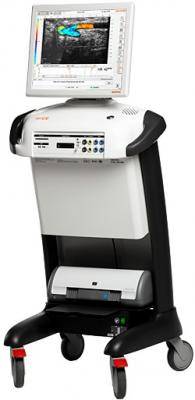
March 16, 2012 – Medistim’s VeriQ system, which uses ultrasound to assess graft blood flow during coronary artery bypass graft (CABG) surgery, recently withstood the clinical scrutiny of the English National Health Service. The VeriQ system combines ultrasound imaging and proven transit time flow measurement (TTFM) in a single system that is specifically designed for cardiovascular procedures.
Specifically, intense review by the Health Service’s National Institute for Health and Clinical Excellence (NICE) prompted two encouraging findings from the agency:
- The VeriQ system reduces major cardiac and cerebrovascular complications, including early graft failure, subsequent angioplasty procedures, heart attack, recurrent angina and death during the period in and around surgery.
- VeriQ reduces costs for health care providers when routinely used for assessing grafts during coronary artery bypass surgery.
VeriQ’s effectiveness was upheld by NICE, in large part due to recent data by Dr. Teresa Kieser, of the University of Calgary.
NICE said that Kieser’s study “recognized that graft dysfunction is a major determinant” in patients surviving coronary artery bypass surgery, emphasizing that “the majority of graft failures in the perioperative (typically, 30 days post-surgical) period are due to technical imperfections which, if recognized, might be corrected at the time of surgery.”
The efficient VeriQ system is already relied upon in about 400 of 1,200 cardiac surgery centers in the United States and now is anticipating greater use in the wake of NICE’s findings, said Howie Milstein, president of Medistim USA Inc.
“The NICE guidance is recognition that we at Medistim have the technology that is proven to reduce complications related to technical errors and graft dysfunction after coronary artery bypass surgery,” Milstein said.
“This is the wonderful news for patients and surgeons,” he added. “It substantiates that the VeriQ system improves lives and meets the finance objectives of the health care industry at the same time.”
Two leading U.S. cardiothoracic surgeons say they understand the impact that the VeriQ system has on maximizing surgical outcomes in this cost-conscious atmosphere.
“Quality control in coronary artery bypass surgery is probably one of the most important predictors of outcomes, and this (TTFM) is perhaps the easiest way to do it,” said Husam Balkhy, M.D., director of the Center for Minimally Invasive Cardiac and Robotic Surgery at the Wisconsin Heart Hospital in suburban Milwaukee.
Michael Caskey, M.D., of Phoenix’s Southwest Heart & Lung, has made Medistim’s technology part of his coronary artery bypass surgery practice for nearly a decade.
“It's great to see it validated from both clinical and economic perspectives,” said Caskey, who specializes in thoracic and cardiovascular surgery. “As surgeons, we truly want the best for our patients, and current economics dictate that certain values may be compromised."
The system has both CE mark in Europe and U.S. Food and Drug Administration approval.
For more information: http://guidance.nice.org.uk/MTG8.


 February 06, 2026
February 06, 2026 









